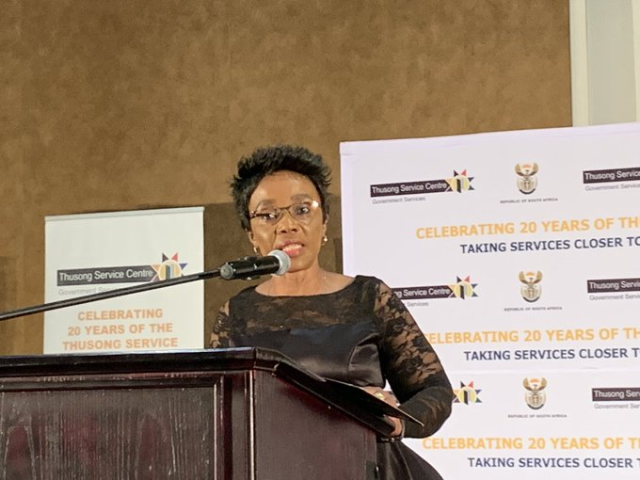SA to Strengthen Gender Equality Systems in Bold Five-Year Empowerment Plan
The plan is anchored in a robust evaluation and accountability framework, with gender mainstreaming and economic justice at its core.

- Country:
- South Africa
South Africa has reaffirmed its commitment to advancing gender equality with the launch of a bold five-year plan to strengthen and monitor systems that drive women’s empowerment. Speaking at the official launch of Women’s Month 2025 at the Sandton Convention Centre in Johannesburg on Friday, Minister for Women, Youth and Persons with Disabilities, Sindisiwe Chikunga, outlined a multi-faceted strategy to shift the country from policy intention to measurable impact.
The plan is anchored in a robust evaluation and accountability framework, with gender mainstreaming and economic justice at its core.
A New Legislative Era for Gender-Responsive Governance
Central to this renewed approach is the anticipated Promotion of Women's Rights, Empowerment and Gender Equality Bill, which will institutionalise gender-responsive planning, budgeting, procurement, and service delivery across all spheres of government.
“The Bill will also provide the enforcement mechanisms that have long been missing,” Chikunga stated, marking it as a long-overdue structural reform to address gender imbalances embedded in public systems.
The department is also working closely with National Treasury to finalise regulations under the Public Procurement Act, a move aimed at bolstering access for women-, youth-, and disability-owned businesses in government supply chains.
Economic Inclusion Through Evidence and Action
Chikunga unveiled a new Socio-Economic Empowerment Index, developed to monitor gender participation across various sectors of the economy. The index aims to deepen analysis of systemic barriers to women’s advancement and help the state measure progress in real-time.
To operationalise this, the Women’s Economic Assembly (WECONA) has been tasked with auditing government expenditure and supply chain patterns to identify gaps and reimagine a women-led industrial revolution.
“No sector should be beyond our reach,” said Chikunga. “We must break free from entrenched barriers and create a women-led economy of scale, creativity, and ownership.”
She further called for the introduction of new indicators of economic progress—ones that include unpaid care work as part of the national value chain. Recognising the care economy—often shouldered by women—will bring hidden contributions into full view in national accounts and budget decisions.
Women’s Month 2025: A Legacy of Resistance Transformed into Reconstruction
Marking this year’s Women’s Month, Chikunga invoked the legacy of the 1956 Women’s March to the Union Buildings. However, she emphasised that modern gender activism has evolved into a more radical, systemic restructuring effort.
“Our transformation agenda is much more daring to the patriarchal script,” she declared. “It seeks to uproot entrenched patriarchal structures that have historically denied women equal participation in economic, political, social and scientific spheres of life.”
Key Achievements Since Democracy
Reflecting on gains made since 1994, Chikunga celebrated the growing presence of women in political leadership:
-
43.5% of South Africa’s Members of Parliament are now women, up from 28% in 1994.
-
The historic appointment of Justice Mandisa Maya as South Africa’s first female Chief Justice.
-
The signing of progressive legislation like the Public Procurement Bill and Land Expropriation Act with gender-responsive mandates.
Another notable achievement is the creation of a R20 billion Transformation Fund, designed to support women industrialists and SMMEs, reflecting the government’s deepening investment in gender equity.
She also noted progress on gender justice and safety, including the passing of the National Council on Gender-Based Violence and Femicide (NCGBVF) Act, which is now being operationalised through the formation of the National Council.
Global Leadership Through G20 and Beyond
Under South Africa’s 2025 G20 Presidency, the country has taken a leadership role in elevating gender issues globally. Through the G20 Women’s Empowerment Working Group, three priorities have been established:
-
Policy development on the care economy
-
Accelerated financial inclusion for women
-
The elimination of gender-based violence
Chikunga described these platforms as vital international vehicles for shaping domestic progress and reinforcing South Africa’s role as a global advocate for gender equality.
Equipping Women for Trade and Financial Leadership
The Women’s Month launch, hosted in partnership with the Department of Sport, Arts and Culture, Standard Bank South Africa, ABSA, and the Gauteng Provincial Government, spotlighted several high-impact interventions:
-
The Women in Trade Initiative, aimed at positioning women entrepreneurs under the African Continental Free Trade Area (AfCFTA).
-
A roundtable on De-Risking Financial Inclusion for Women, focused on expanding women’s access to capital and financial systems.
These events aim to equip women with market knowledge, export-readiness tools, and business development skills, aligning with broader goals of building a more inclusive and globally competitive economy.
Looking Ahead
Chikunga closed her address with a powerful reminder: “Economic emancipation cannot wait. Gender equality must not be aspirational—it must be real, tangible, and measurable.”
Over the next five years, South Africa’s gender equality strategy will focus on legislative enforcement, economic participation, care work recognition, and leadership inclusion—marking a clear path forward from commitment to change.
ALSO READ
Mashatile Calls for Balanced Trade as South Africa-China Ties Deepen
Agricultural drought threatens South Africa’s food security as farmers struggle to adapt
National Indaba Launched to Combat Foot and Mouth Disease in South Africa
Transformative Ties: India and South Africa's Strengthening Relationship
EXCLUSIVE-US diplomats asked if non-whites qualify for Trump refugee program for South Africans










